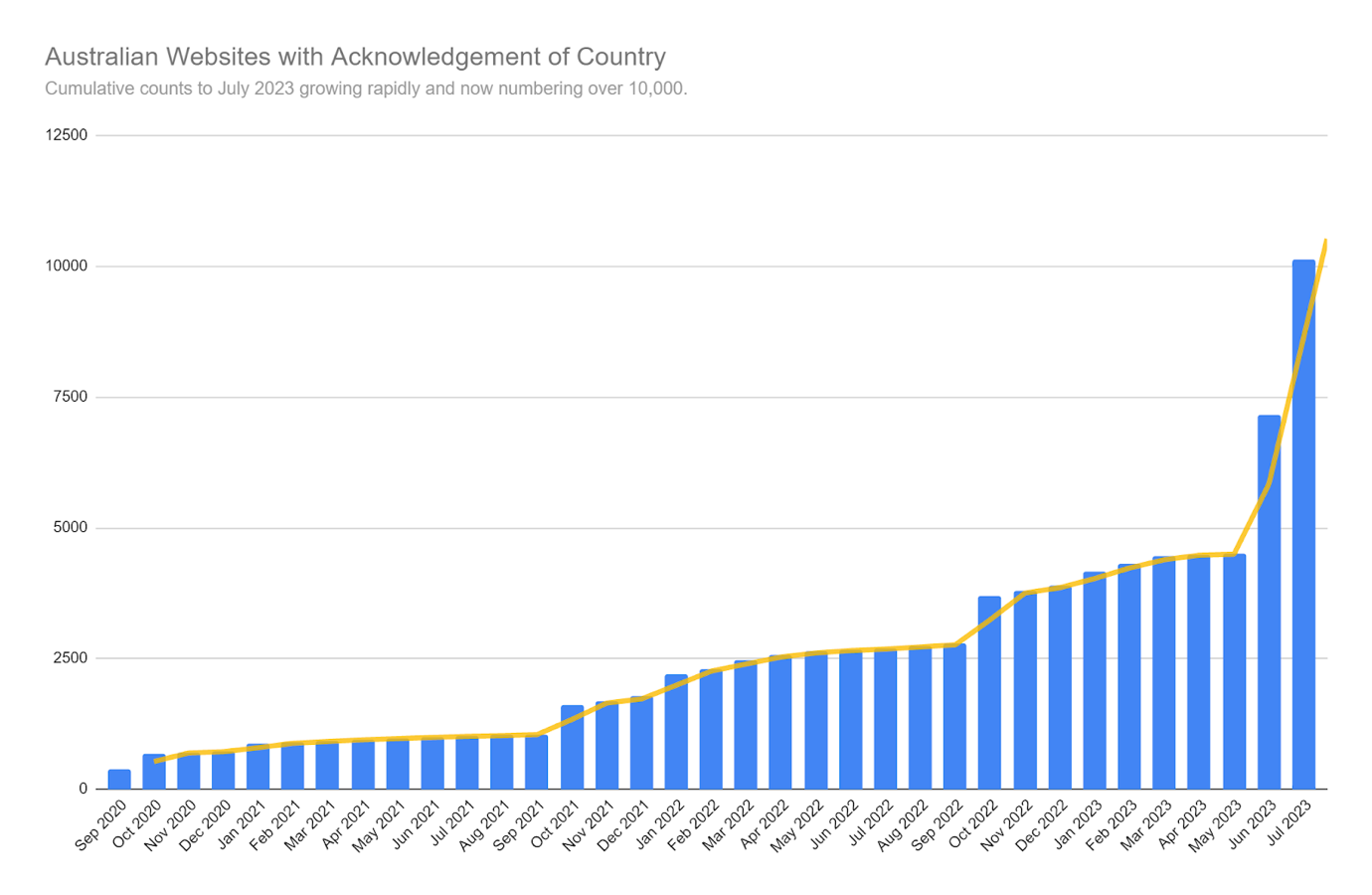Business Support for Indigenous Causes Is Growing
New Web Data Analysis Shows Changing Norms
The war of words surrounding the Voice referendum has created a fog that masks long-term trends. Analysis of online data and behaviour offers a new perspective on how norms are changing in relation to Indigenous causes, and the actions of businesses are an important dimension of the change.
Not long ago, the notion that Australians would give up a public holiday and choose to work instead was inconceivable. Yet, in a form of silent protest, more and more people are electing to work on Australia Day. This single social development signals the death of Australia Day on 26 January. It just doesn’t know it yet.
Also, not long ago, in 2008, no Australian websites had an Acknowledgement of Country (AoC) statement. Today, thousands do.
Indeed, the Australia Day Council website has an Acknowledgement of Country statement. This incongruity captures the tension that exists in Australia as we try to reconcile our colonial history with our contemporary values and ambitions as a nation.
‘The Australia Day Council’s ironic messaging and the changing attitudes towards Australia Day are just the tip of the iceberg. A groundswell of support for greater recognition of Indigenous Australians, and support for all manner of related social justice causes, seems well underway.
‘There are public figures who argue that Westfarmers, with its $2 million donation to the Yes campaign, should not be sticking their social conscience where it is not wanted. Yet, the data shows Westfarmers is not acting in isolation, but is part of a large and diverse cohort of businesses in Australia increasingly recognising and formally engaging with Indigenous Australians,’ said Michael Parker, a communication consultant and co-author of the analysis.
The analysis shows that businesses, and many otherwise conservative organisations, are at the forefront of changing social norms if an Acknowledgement of Country statement is used as a proxy for more general support for Indigenous causes. This support has been growing since well before the referendum came into focus.
Acknowledgement of Country statements are growing fast
At a minimum, more than 10,000 Australian websites now publish an AoC statement. In the last three years, AoC statements on websites have been growing by about 10% per month and this growth is accelerating.
The first AoC statements began appearing in 2009, according to the analysis. The very first site to publish an AoC statement appears to have been the rather innocuous Australian Institute of Health and Welfare, an Australian Government statistic and data outfit based in Canberra. Reconciliation Australia was a more obvious early mover.
Cumulative Count of Australian Websites with Acknowledgement of Country
August 2023
By contrast, Abicus, a vinyl record and fashion store in the cool Newcastle suburb of Cooks Hill, has a solid AoC statement. Their customers are mostly young cultural opinion leaders.
Seafolly (founded in 1975) and Akubra (since 1874) also have AoC statements on their websites. Seafolly has an affinity with our beach culture and Akubra made both the Slouch and Squatter hats. And special mention goes to Paddy Pallin, a brand loved by bushwalking boomers. Today, the survival of these brands is directly linked to the cultural affinity they have with their markets. Their customers are cultural opinion leaders.
At least 30 publicly listed companies have AoC statements and 11 of these are in the top 200 by market capitalisation.
Opinion leaders change social norms
Companies don’t want to be on the bleeding edge, but eventually, their antenna detects that public opinion is changing and so they go with the flow. Since 2020, many online retailers specialising in fashion and e-commerce, such as Amberdays, Abicus, and Bassike, began including AoC statements as well. Many of Australia’s largest organisations, including Telstra, Woolworths, and the Commonwealth Bank, have also added AoC statements to their websites. Any tourism entity that does not have an AoC statement is out of tune.
‘Today, recognition and support for Indigenous recognition and social causes have an orthodoxy to them, they are becoming conventional,’ Parker said.
Another proxy for change, one that is indicative of a deeper commitment to Indigenous interests, is the growth in organisations developing Reconciliation Action Plans (RAPs) and having them recognised by Reconciliation Australia.
Search interest in RAPS has doubled in the last five years. And, according to Reconciliation Australia, there are now 2,400 organisations with a current RAP.
Google Search Trends for Reconciliation Action Plans
Over the Last Five Years
‘Using Google data, we see there are now at least 400 organisations that have published their RAP online. As with AoC statements, the diversity is fascinating. Whitehaven Coal has one. So do Foxtel, the ANZ, and Suncorp. There are multinationals, like Amazon and Unilever, and there are caravan parks, nursing homes, and football clubs. The number is surely growing,’ said co-author and data scientist Paul McCarthy.
Reconciliation Australia measures the perceptions of RAP participants every two years. The 2020 report uses data from 28,000 people across 92 organisations. It found that 58% strongly agree that Indigenous cultures are important to Australia’s national identity, compared to 45% in 2014. Moreover, 78% strongly agree the relationship is important, up from 69% in 2014.
‘Interestingly, in terms of Google search behaviour, we also know that NAIDOC Week[1] has been steadily growing over the last few years. Searches for ‘Australia Day debate’, were about the same number as searches for NAIDOC Week in 2023,’ McCarthy said.
The data suggests companies know which way the wind is blowing
Companies that want customers tomorrow, sports teams that want fans, or institutions that want patrons, know that being in tune with trends in public opinion is vital.
There are similarities with the marriage equality debate. The support of so many community organisations, such as clubs, is vital because of their grassroots connections. businesses appear to be stepping up to the recognition and reconciliation in a similar way. That support should accelerate the adoption of new social norms, consolidate public opinion and change Australia’s culture.
‘Criticism of the motives businesses have in associating with social causes is not without merit. Too often such associations are overly opportunistic and impure but, in the case of AoC statements and RAPs, it is hard to see how. Surely the more businesses support the values of diversity, equality, and social justice, the better we all will be,’ Parker said.

Michael Parker Paul X McCarthy
Director Director
Praxis Communication League of Scholars
For further information:
Or call Michael or Paul for further information or an interview:
Michael: 04233 121 354
Paul: 0418 608 224
[1] NAIDOC is the National Aborigines' and Islanders' Day Observance Committee, and NAIDOC Week has been running since 1975, with roots to the 1938 Day of Mourning.
Key Facts:
Online data and behaviour show business support for indigenous causes has grown steadily over the last decade and is growing faster.
About us:
League of Scholars is a data science consulting firm and Praxis Communication is a public communication consultancy.
The full report can be found here: https://papers.ssrn.com/sol3/papers.cfm?abstract_id=4578361
Contact details:
Co-authors are:
Paul McCarthy, League of Scholars : 0418 608 224
Michael Parker, Praxis Communication: 04233 121 354




